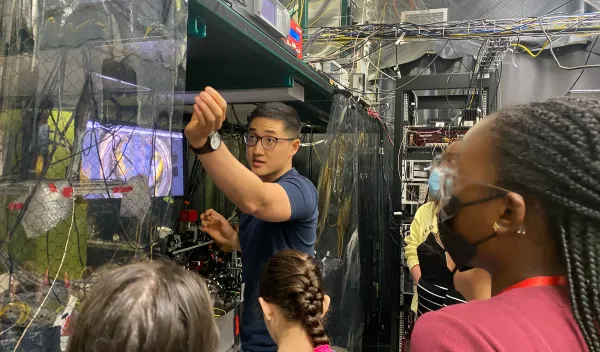
More institutions to participate in quantum science and engineering with $38M from NSF
The U.S. National Science Foundation is investing $38 million to expand its support for quantum information science and engineering (QISE). From advancing the ways in which we create sustainable energy to improving cyber security, NSF's Expanding Capacity in Quantum Information Science and Engineering (ExpandQISE) program is funding cutting-edge research across 22 grants. The program also broadens participation by building strong connections between new initiatives and existing high-impact QISE research, training, education and outreach efforts.
The "National Quantum Initiative Act" was passed in 2018 to meet the needs of the emerging field and ensure the U.S. continues serving as a global leader in science and engineering. For this purpose, NSF developed the ExpandQISE program to lower barriers to access and broaden the diversity of participating institutions. This program helps grow QISE research capacity at institutions across the U.S. that have yet to be heavily engaged in such research and education. The support involves new collaborations between emerging research institutions and existing research centers such as NSF Quantum Leap Challenge Institutes, Department of Energy National Research Centers, NSF Quantum Foundries, and leading QISE research Institutions. Minority-serving institutions and jurisdictions participating in the NSF Established Program to Stimulate Competitive Research (EPSCoR) are especially encouraged to apply.
"If we want America to be the first to explore and understand the quantum-scale frontiers of science, then we must support the excellence that exists at institutions all over our country," said NSF Assistant Director for Mathematical and Physical Sciences Sean L. Jones. "NSF's support for these new projects demonstrates our commitment to nurturing innovative ideas and people, wherever they are."
NSF awarded a total of $38 million across 22 grants spanning a variety of subjects, including physics, computer sciences, materials research, engineering and chemistry. Among the 22 awardee institutions are six historically Black colleges and universities and three Hispanic-serving institutions. Additionally, five awardee institutions are in jurisdictions participating in EPSCoR, which enhances the research competitiveness of targeted states, territories or commonwealths by strengthening science, technology, engineering and mathematics capacity and capability.
"Agency-wide, NSF is laser focused on making strategic investments that enhance access and preparation in quantum and the interest and participation among diverse groups in all settings, regions and jurisdictions across the country," said NSF Assistant Director for STEM Education James L. Moore III. "Through these investments in quantum education, the agency is creating opportunities everywhere."
Track 1
Track 1 awards are for individual researchers collaborating with institutions with extensive QISE experience. Awardees will receive up to $800,000 over a period of three years.
The following projects were funded under the Track 1 pathway:
-
Quantum molecular dynamics on quantum computers, Marquette University.
-
Development of Er-doped semiconductor nanophotonics to realize optoelectronic capabilities for quantum information applications at telecom wavelengths, West Chester University.
-
Scalable quantum gravimeters with large-momentum-transfer atom interferometry, Rutgers University-Newark.
-
A deep-dive into the materials science of alpha-Ta growth on oxides for superconducting resonator development, Miami University.
-
Quantum@MTSU: Building QISE research and education in middle Tennessee, Middle Tennessee State University.
-
Investigating biomass pretreatment with nanodiamond quantum sensors, Southern Illinois University at Edwardsville.
-
Analog quantum simulation of non-Markovian dynamics of multi-qubit systems, New York Institute of Technology.
-
Collaborative optimization and management for iterative and parallel quantum computing, Fordham University.
-
Harnessing anti-hermiticity and symmetries to probe exceptional entanglement transition and supersensitive quantum sensing, Kennesaw State University Research and Service Foundation
-
Harnessing a scalable platform to demonstrate multipartite quantum effects under strict conditions, University of New Orleans.
-
Understanding and controlling decoherence in hybrid spin qubit-magnon systems for advancing education and building workforce in emerging quantum technologies, Wichita State University
-
Development of quantum information science programs at an undergraduate institution through research in 2D qubit systems, University of Northern Iowa.
-
Prairie View A&M University - Virginia Tech partnership in quantum science & engineering research and education, Prairie View A&M University.
-
Light-controlled magnetism in Floquet-Bloch systems, New Mexico Institute of Mining and Technology
-
A Quantum Good Network Protocol (QGP) and implementation for security-enhanced network authentication, Morgan State University.
-
Ferroelectric ordering and polarization-coupled transport properties in 2D van der Waals materials, South Dakota School of Mines and Technology.
-
Micron scale solid state quantum sensors optimized through machine learning, Morgan State University.
Track 2
Track 2 awards are for teams of up to five people paired with external research collaborators with deep QISE research experience. Awardees will be granted up to $5 million over a duration of five years.
The following projects were awarded in Track 2:
-
EQUIP-UMB-Expand quantum information programs at UMass Boston, University of Massachusetts Boston.
-
Leveraging synthetic degrees of freedom for quantum state engineering in photonic chips, City College of New York.
-
A quantum science education and research program for HBCUs: Exotic physics and applications of solid-state qubits, Howard University.
-
Expanding quantum research and education at Winston-Salem State University with research on hybrid microwave-optical quantum devices, Winston-Salem State University.
-
NC A&T QISE research workforce development programs, North Carolina Agricultural & Technical State University.
Learn more about the ExpandQISE program and visit https://www.nsf.gov/.
